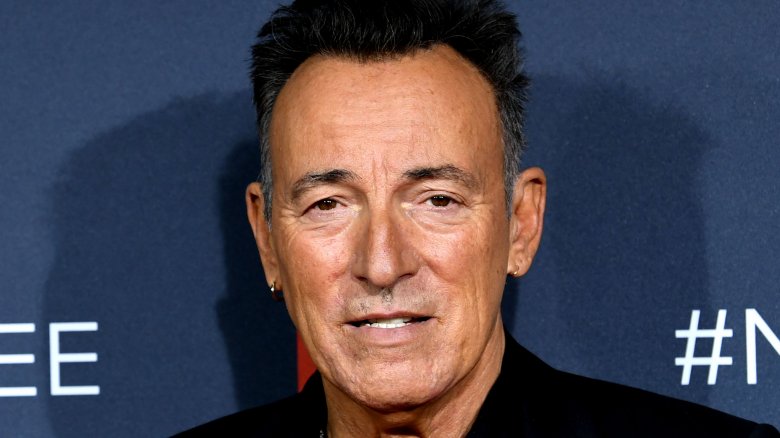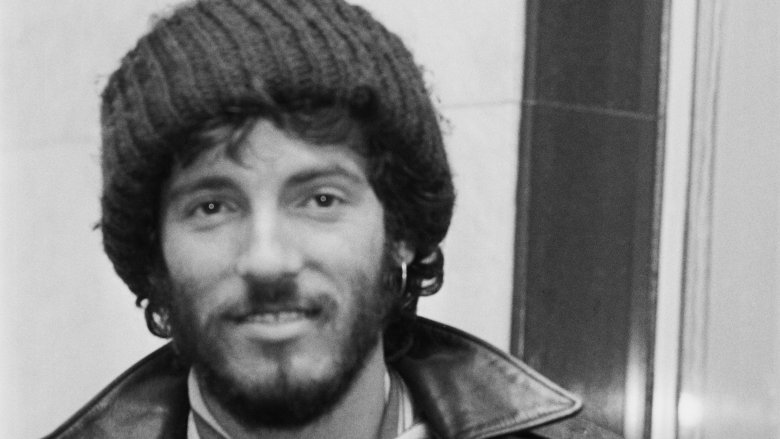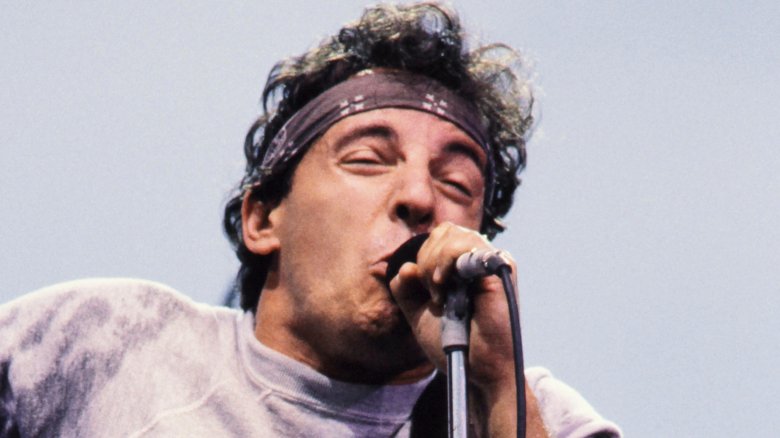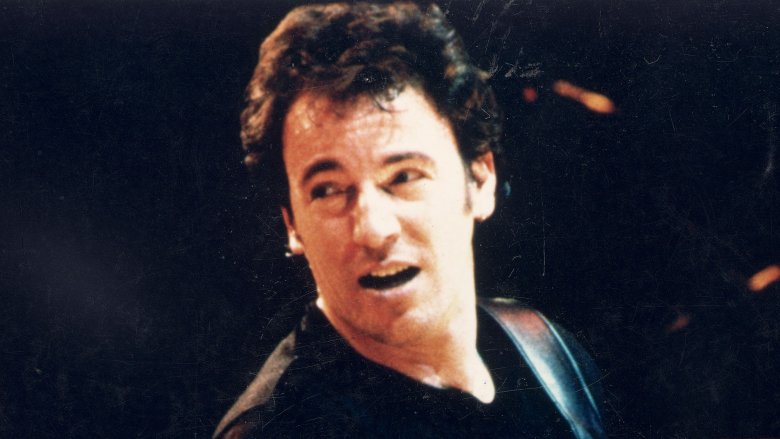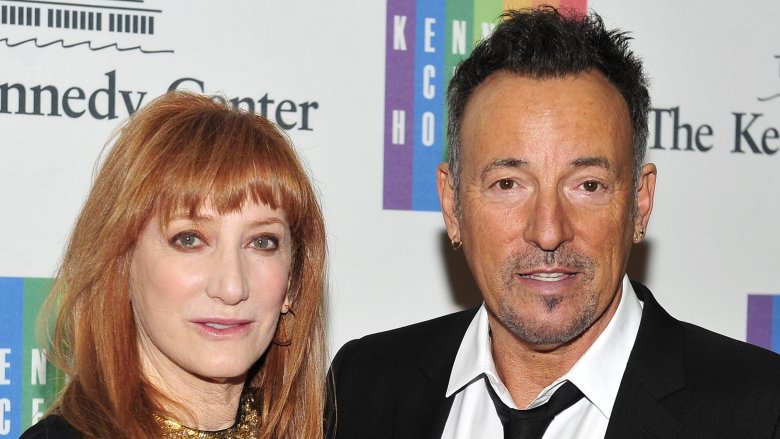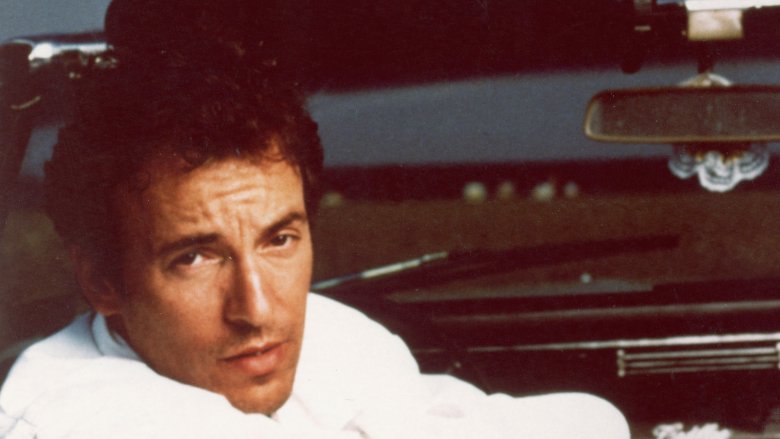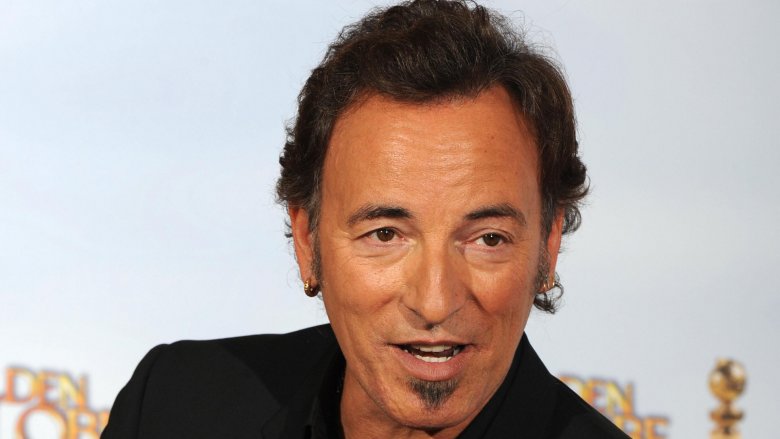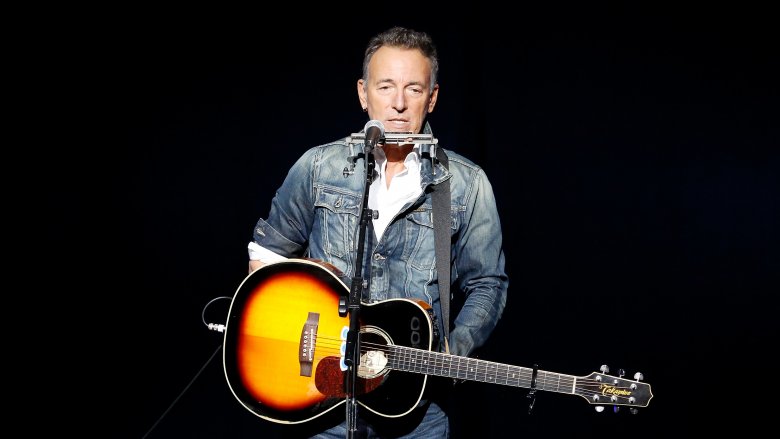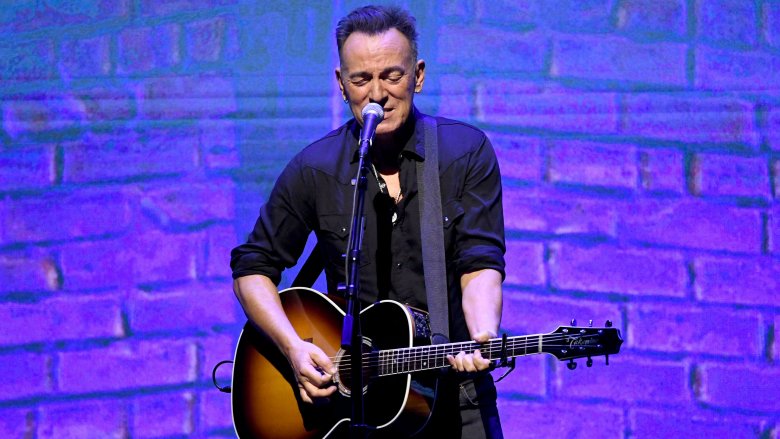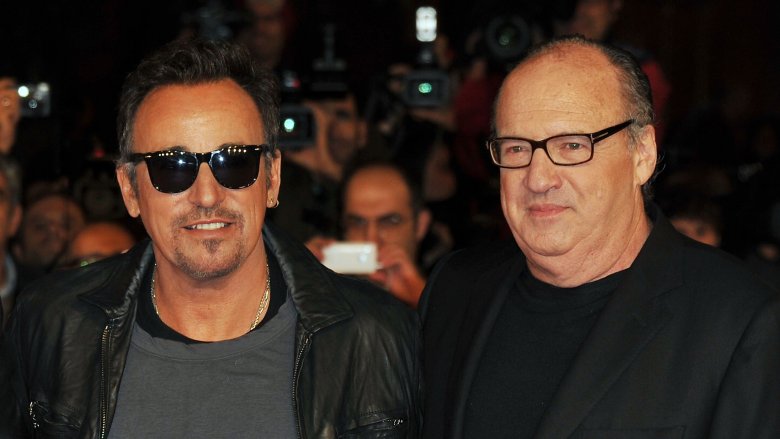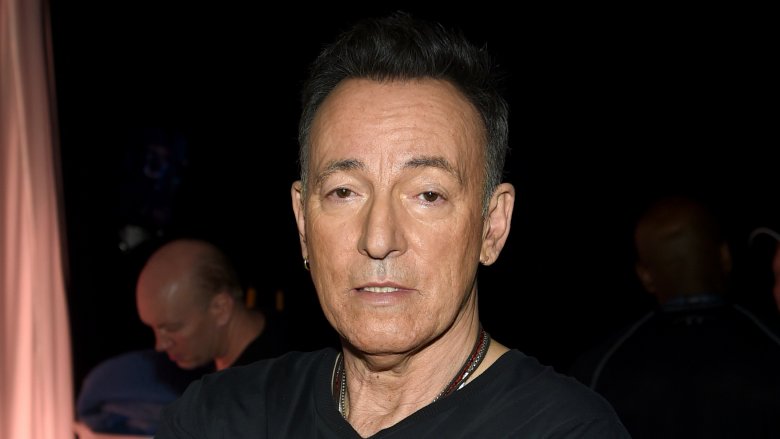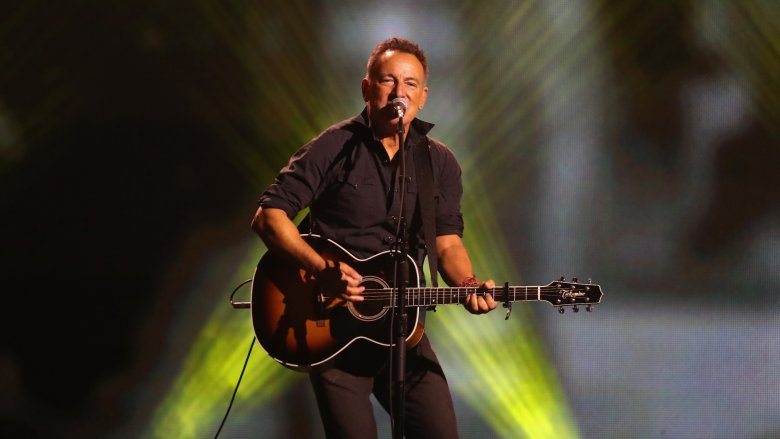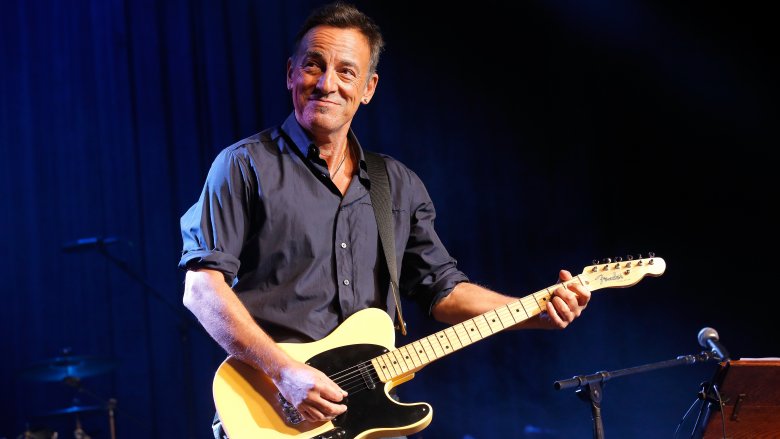The Untold Truth Of Bruce Springsteen
The man. The myth. The leader of the E Street Band. The Boss. Bruce Springsteen is one of the artists who can safely count themselves in the pantheon of American rock gods. The Boss has been making his mark on the world's musical landscape (and improving the reputation of people from New Jersey) since the 1970s, and even today, he shows no signs of slowing down. From the anthemic "Born to Run" to the introspective "Streets of Philadelphia" to the sheer magnificence of "Thunder Road," Springsteen has graced the world with so many classic songs that attempting a definitive listing of his hit singles alone from the past five decades would be almost as impossible as it would be insulting. Dude made a lot of excellent music, is really the takeaway here, more than enough to produce an award-winning Broadway show in 2017.
Still, despite the fact that he tends to wear his heart on his musical sleeve, Springsteen is less known as a person than he is as an artist. Today, we'll attempt to fix this by taking a long, hard look at his key moments over the years — the moments that not only made him Bruce Springsteen the talented artist but also made him Bruce Springsteen the man. This is the untold truth of Bruce Springsteen.
Bruce Springsteen and the Greetings from Asbury Park era
Bruce Springsteen's 1973 debut album, Greetings from Asbury Park, N.J., is hardly his best album, but in a way, it's his most influential. After all, it's how the world found out about Springsteen's music. And as Rolling Stone tells us, for young Springsteen himself, it was certainly the most important album. While he'd been making small waves in the local music scene before, Greetings was where he started to draw lyrical material from his personal experiences and reinvent himself into the storytelling juggernaut we now know. The album also introduced the world to a proto-lineup of what would soon become the E Street Band.
Apart from the emergence of his songwriting prowess and backup band, Springsteen had a bit of luck to help along with his debut album. For example, it was produced by two music veterans who'd been writing songs for industry heavyweights like the Partridge Family. Plus, a single song on the album ("It's Hard To Be A Saint In The City") was impressive enough to land the Boss a deal with Columbia Records.
Springsteen wrote Born in the U.S.A. out of guilt
Bruce Springsteen's most glorious stadium rabble-rouser, "Born in the U.S.A." has all the makings of an unofficial national anthem ... as long as you don't listen to the lyrics, which as NPR tells us, are from the viewpoint of a desperate Vietnam vet who returns to a country that has no place for him anymore. There's a reason for this strange mismatch between the drab lyrics and uplifting tunes: As New Jersey 101.5 reports, the Boss was very close to fighting in Vietnam himself, but he reacted to this daunting possibility by becoming a "stone-cold draft-dodger."
Biography writes that Springsteen's sole thought upon his possible future in warfare was, "I ain't going." So he put on an act that involved pretending to be high on LSD, acting like a total maniac, and invoking a concussion from a past motorcycle accident. It was his guilt of cheating his way into a 4-F classification and dodging the draft that ultimately led to him writing "Born in the U.S.A." Presumably, it also had something to do with him becoming an influential and generous figure in Vietnam veteran charity circles.
How Bruce Springsteen became who he is today
Bruce Springsteen is the kind of guy who makes artists half his age go pale when they see his touring schedule and concert lengths. As Entertainment Weekly notes, his concerts in the 2010s have been known to last for over four hours. However, it wasn't always that way. As Ultimate Classic Rock tells us, the Boss first made his name as a touring workhorse and a masterful performer during a stage of his career when he was a virtual has-been.
While this might seem ironic now, relevancy was a pressing issue for Springsteen in 1978. He'd spent close to three years lingering in limbo thanks to bitter legal struggles with his manager that followed the '75 smash hit, Born to Run. By the time he was free to run, Springsteen had to sell himself to the public all over again ... which he did by taking his band on the road and playing over 110 concerts, averaging just shy of three hours apiece. And the man wore his heart on his sleeve for every single one of those seconds. The "raw emotion" Springsteen displayed (along with the sheer quality of his tunes) won the public over, and by the time the tour finished, the Boss had cemented his status as one of the most electrifying performers in rock.
Bruce Springsteen's relationship with Patti Scialfa
Rock stars and unhealthy relationships go together like peaches and cream. However, while Bruce Springsteen isn't exactly exempt from this rule, he's apparently discovered the secret of combining a happy marriage with a musician's lifestyle ... and all it took was marrying a bandmate. As The Vintage News tells us, Springsteen found himself growing closer with E Street Band member and longtime friend Patti Scialfa. This eventually led to them becoming an item, though this happened when Springsteen was still married to his first wife, Julianne Phillips (see: rock stars and unhealthy relationships).
Despite the less than optimal start of their relationship — Springsteen was still married and in the process of "abandoning" Phillips when he was already moving in with Scialfa — the Boss found Scialfa a "formidable" partner who fought and loved him with equal passion. After a few years of keeping their relationship "on the tour," Springsteen and Scialfa tied the knot in 1991 and have remained together ever since.
Springsteen's torturous Born to Run sessions
During the making of 1975's Born to Run, Bruce Springsteen was haunted by a feeling that it was his last chance to make anything of himself. As Rolling Stone reports, he wasn't just being paranoid. His record company had undergone a major personnel shuffle, and the people left afloat weren't particularly supportive of him at the time, so he was quite possibly justified in thinking that he faced a do-or-die situation.
With no real backup plan if he failed, Springsteen reacted by driving himself and the E Street Band into the ground over the course of several months. The painful process took so long that it delayed Born to Run to the point where its namesake single had already been out for six months by the time they were done, at which point Springsteen was so exhausted that he started hating the record and actually threw a physical copy of it in the pool after hearing the mastered version for the first time. Fortunately, this was mostly just nerves, and the public would soon prove that his worries were for not, as the album became a success.
His net worth is quite impressive
"How much is this celebrity worth?" is a question that tends to generate healthy interest online, and Bruce Springsteen is no exception. While sites like Celebrity Net Worth guesstimate his bank balance somewhere in the $500 million region and his annual "salary" at a whopping $80 million, Forbes managed to dig up some figures that are likely more accurate and almost as impressive. According to the magazine, Springsteen's net worth in 2016 was a very cool $460 million, which made him the 14th wealthiest celebrity in the U.S. His most impressive asset is perhaps a 200-acre horse farm in Colts Neck, New Jersey, that's valued at $10 million.
However, Springsteen's current finances aren't the most impressive thing about him. That honor goes to the sheer touring revenue he's generated over his many decades of life on the road. In fact, between the 1970s and 2016, his various tours have grossed an estimated $1.5 billion. No wonder they call him the Boss.
He reinvented himself with Nebraska
Bruce Springsteen's 1980 double album juggernaut The River was a giant, chart-topping success, in no small part thanks to its numerous radio-friendly hits. Following up an act like that was never going to be easy, and Ultimate Classic Rock tells us the Boss originally intended to stick to his winning formula with another stirring rock album. However, he soon ran into a problem. His new songs, while powerful, were dark and moody, and the rousing rock of the E Street Band was both unfitting and unnecessary to back them up. Springsteen had recorded the vast majority of the new songs in a portable studio in his bedroom, accompanied by only his guitar tech, Mike Batlan, in a single session that ran late into the night. The demos he created during this marathon all-nighter had a raw emotion that he found more powerful than the "finished" versions he and the E Street Band were tinkering with.
As a result, Springsteen decided to take a creative chance and release his pared-down solo takes as his next album. The end result was 1982's Nebraska, an introspective, no-hype work that The Guardian ranks as one of his top five albums. Springsteen evidently liked the stripped-down acoustic process well enough, seeing as he took the same route on 1995's The Ghost of Tom Joad and 2005's Devils & Dust.
Bruce Springsteen unveiled new talents on Western Stars
Bruce Springsteen adopted a brand new method of musical mayhem with his most recent album, 2019's Western Stars. Instead of the relatively pared-down arrangements of his "solo" albums and the bombastic sound of the E Street Band, the album is heavily orchestrated. According to NPR, its influences come from strange places such as 1960s soul, 1970s pop and Burt Bacharach, a guy who co-wrote songs like "Raindrops Keep Fallin' on My Head." Plus, Springsteen's lyrics describe a series of characters who are down on their luck and a little bit past their "best before" date. While this may seem like a fairly strange combination for a stadium rocker, Metacritic reveals that the album was in fact quite well-received, and more than one critic has described the album with the ever-elusive term of "masterpiece."
Springsteen opted against touring the album (thus tragically robbing the world of his particular brand of orchestra-backed live crooning), but as Deadline notes, Springsteen aficionados still get a chance to see the Boss perform his arguably most off-brand album. How so? Well, he's filmed a movie where he performs all of the album's songs.
What are Bruce Springsteen's politics?
As The Guardian tells us, Springsteen has "a reputation for political involvement," which is putting it mildly (although the Boss has been stepping away from political discourse in recent years). His politics may appear fairly liberal, as he's canceled a show in North Carolina to protest the state's transgender "bathroom law," supported food banks and striking workers, and of course, pointed out the troubles faced by Vietnam veterans. However, his actual politics are rather non-partisan, and while his views about people's "right to a job, medical treatment, education, decent housing, childcare, and open government" may sound like they're straight from the Bernie Sanders playbook, Springsteen himself considers his politics anything but left-wing. As he puts it, "To me, these are all conservative ideas. ... Economic stability. Health. That's not remotely radical."
Springsteen got a lot of his political views from his longtime manager and friend Jon Landau (pictured above), who he calls the Lewis to his Clark and who got him interested in social and political issues way back in the '70s. Despite occasional accusations of "brainwashing" the Boss into liberalism, Landau has hardly attempted to shape the rock star's views. He merely directed Springsteen to films and books that would provoke the artist to form his own opinions.
Springsteen deals with depression
Depression might not be the first thing you'd associate with an electric, forceful performer like Bruce Springsteen, but it's a disease he's battled all his life. As The Guardian and NME tell us, he's actually experienced crushing breakdowns that have left him feeling "like an empty vessel" since 1982. He still has no clue about all the triggers of his mental health troubles, but he's very open about them and has grown to recognize the warning signs early on.
He's aware that mental health issues run in his family, and he suspects that he got into music as a teenager at least partially in order to combat depression. Most importantly, he's more than willing to reach out for help. When his wife recognizes an impeding case of what Springsteen eloquently refers to as "a freight train bearing down, loaded with nitroglycerin and running quickly out of track," they will seek a doctor and get his medication up to date. Springsteen also sees no shame in seeking out professional help, and he saw his first psychotherapist as early as the 1980s.
The truth about his first marriage
Bruce Springsteen has been with Patti Scialfa for decades now, but his first marriage to model/actor Julianne Phillips was a significantly more strained affair. According to The Vintage News, Springsteen met the striking Phillips in Los Angeles, and the two got hitched in 1985. Unfortunately, their relationship soon devolved to a cold, emotionless affair. The seeds of disaster were present quite early, as Springsteen went through a series of what he describes as anxiety attacks after the wedding, realizing that he wasn't ready to settle down. Their marriage was essentially over just two years after the wedding, and they finally divorced in 1989, at which point Springsteen was already with Scialfa.
In his 2016 autobiography, Born to Run, Springsteen places a lot of the blame about the way things went on himself. Before Scialfa, he used to have a tendency to end his relationships after three years at most, due to his difficult childhood which had rendered him unable to accept that his partners could genuinely love him. He feels sorry that Phillips got the brunt of this unhealthy attitude.
Bruce Springsteen's alleged affairs
Despite a career that's spanned so many decades, Bruce Springsteen has managed to keep his private life fairly private and hasn't been involved in too many personal scandals. Still, that doesn't mean his scandal slate is entirely blank, as he's been accused of cheating on his wife, Patti Scialfa, multiple times. As The Independent tells us, in 2006, the singer faced allegations that he'd had an affair with "a 9/11 widow he met while organizing a benefit concert for victims of the terrorist attack." Springsteen reacted to the situation by posting a short statement on his website, carefully denying any and all marital scandals.
In 2009, Springsteen's alleged cheating woes returned when, according to People, the Boss was accused of an affair with Ann Kelly, a woman whose husband accused her of committing "adultery with one Bruce Springsteen ... at various times and places too numerous to mention." As this attack was made as part of the couple's divorce proceedings, Mrs. Kelly immediately filed a counterclaim that said her husband was trying to cash in by making Springsteen pay to have the scandal go away, and she pointed out in no uncertain terms that her husband was hardly a saint. Both Springsteen and Mrs. Kelly adamantly denied any and all allegations of a tryst between them, and they say that their only connection is that they went to the same gym.
